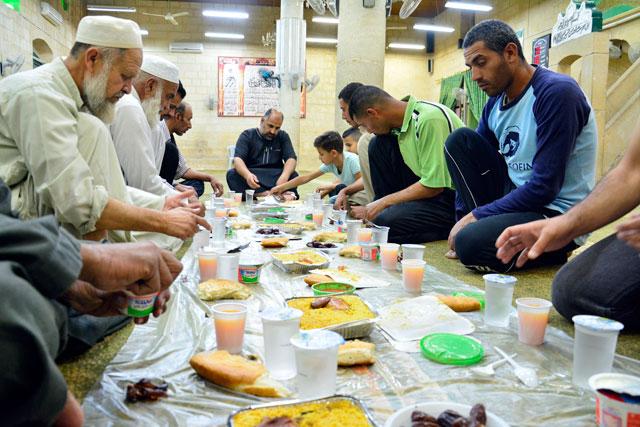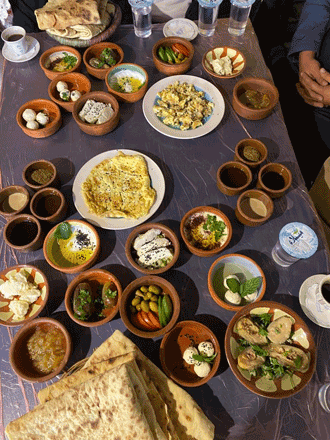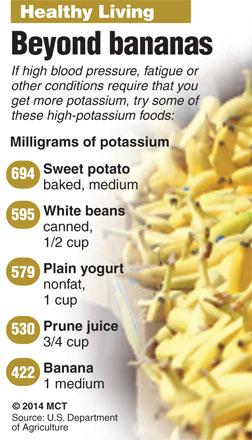You are here
'Ramadan is opportunity for people to develop healthier habits'
By Abdul Rahman Bazian - May 04,2019 - Last updated at May 05,2019

Muslims are seen breaking their fast during Ramadan last year at a mosque in Salt (Photo courtesy of Amjad Ghsoun)
AMMAN — Ahead of the holy month of Ramadan, nutritionists and health experts have suggested a number of practices eating habits to maximise the benefits of fasting (sawm).
With the new moon of Ramadan, Muslims around the world prepare to begin their yearly ritual, to fast from the break of dawn till sunset, for a whole lunar month.
“Do not save your energy,” sport rehabilitation specialist and Personal trainer Emran Abu Rayya told The Jordan Times.
Contrary to common practice, fasting is good for health if one eats in moderation and does not fall in the trap of conserving energy, he said.
“As for food, eat fruits and lots of greens, as well as carbs and protein, and do not consume your main courses all at once,” the trainer said.
Weight goals
“If your aim is to lose weight, work out two to three hours before breakfast, for around 45 minutes, four to five times a week,” Abu Rayyan said.
The same goes for weight gain, he said, “only the workout should be two to three hours after breakfast”.
Diabetes expert and clinical dietician Riwa Kahale warned the exercise should not be strenuous.
“Do not consume a lot of sugar. It messes up your metabolism,” Abu Rayyan said, adding that one should split food intake over five meals from breakfast to suhour (food before dawn), which is the last meal before the break of dawn.
“The last meal however, should be rich in carbs and fibres,” he pointed out.
Kahale said it should be balanced as well, “but stay away from sugary and salty foods at suhour”.
“For suhour, eat full-grains and oats, for instance, with a side of milk for example.”
“Sugar-rich foods boost your insulin levels, which makes you hungrier for more sugar within just a couple of hours, and the cycle goes on and you start storing excess sugar as fat and you work your pancreas to exhaustion until you start developing insulin resistance, which leads to diabetes,” Kahale said.
Eating habits
For breakfast, it is customary in the Sunna, the heritage of Prophet Mohammad, that one breaks their fast with dates and water and then prays, before starting with the main courses of one’s breakfast, said Hind Shanquiti, a once-preacher, said.
Islamic scholars have not concluded on whether this is a strict discipline, she said, adding, but there are barely minutes between the call to the Maghreb prayer, at sunset, and the prayer itself, which supports the habit of breaking fast, praying, then eating the main courses, she argued.
“Plus, I found it healthier and lighter,” Shanquiti said.
“I drink yogurt with my dates, pray, then join the family at the breakfast table. By the time I’m done praying, I am not that hungry anymore and my body is not shocked by the sudden intake of large quantities of food,” she said.
After long hours of fasting, it is quite unhealthy to consume large quantities of food all at once, Kahale said.
“It is always better to give your body some time to warm up your digestive system before eating chunky foods after a long day of fasting,” she noted.
The brain takes around 20 minutes after eating the first bite of food to register fullness, Kahale underscored.
“Thus, breaking fast with dates and then praying before the main course helps people moderate their intake, such that they do not consume large quantities all at once.”
That causes the stomach to expand beyond its natural size, which over time makes people eat more and gain weight, while putting a lot of strain on other organs to keep pace with the digestion process of large quantities of food consumed suddenly, Kahale said.
“In the long term, too, it increases the risk of various non-communicable diseases associated with weight gain, continuous consumption of fatty foods and digestion issues,” she added.
As for yogurt, it is rich in microflora, probiotics, protein and calcium, which are very good for your health, Kahale stated.
“All in all, it is certainly better than all the sugary drinks some consume,” she said.
But for people who want to lose weight, it is best to drink water instead of yogurt, since water is calorie-free, she pointed out.
“Eat balanced meals, give your stomach time to warm up, stay away from sugary and salty foods, work out within reason, go for yogurt if it suits you and your goals, but bottom line is; moderation is key.”
“Ramadan is an opportunity for people to restart their metabolism to a healthier beat with new habits.”
Related Articles
AMMAN — Nutritionists encourage people not to overload on sugar and sweets during Eid Al Fitr in order not to “shock” the body after fasting
AMMAN — To maximise the benefits of fasting during Ramadan, experts are urging people to avoid excess and follow a healthy, balanced diet.&n
AMMAN — Dieticians recommend eating foods that are rich in potassium and low in sodium for the pre-dawn suhour meal, to help fasters endure

















